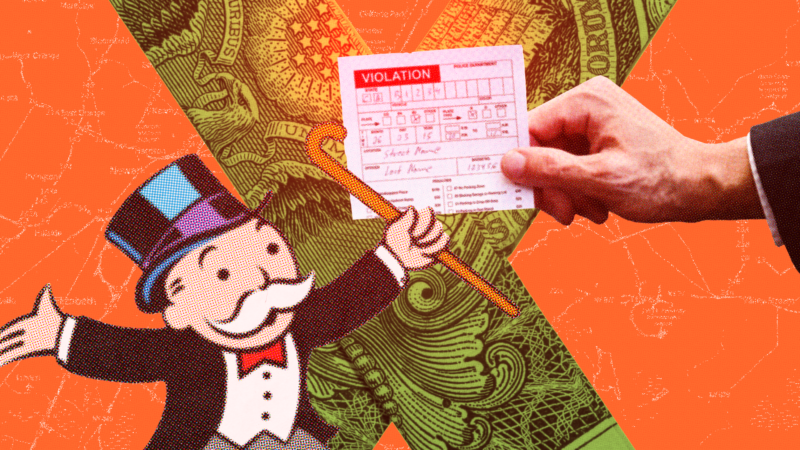
Should New York City force rich people to pay higher parking tickets than poor people? That's the question at the heart of a bill before the City Council right now.
City Councilmember Justin Brannan, who represents Bay Ridge, Dyker Heights, Bensonhurst, and Bath Beach (all in south Brooklyn), is proposing the creation of a pilot program to implement a day-fine system for civil offenses. Day-fine systems are used in several European countries and have been tried stateside in places as disparate as Maricopa County, Arizona, and—briefly, in the 1980s—the New York borough of Staten Island.
"First, the court sentences the offender to a certain number of day-fine units (e.g., 15, 60, 120 units) according to the gravity of the offense, but without regard to his or her means," explained the Vera Institute of Justice's Judith Greene in a 1990 report assessing the efficacy of Staten Island's program. "Then the value of each unit is set at a share of the offender's daily income (hence the name 'day fine'), and the total fine amount is determined by simple multiplication."
"During [Michael] Bloomberg's time as mayor of NYC, fines became just another way to raise revenue rather than a way to deter or change bad behavior," Brannan tells Reason. "Fine amounts are arbitrary as it is so why should a public school teacher and a billionaire pay the same fine? For instance, a $115 ticket for a working family of four could be a real hardship whereas a $115 ticket for an individual making $500K is a joke and does absolutely nothing to change their behavior."
Brannan is just proposing a pilot program and says many of the details have yet to be worked out, but he anticipates only applying higher fines to people making over $500,000 in income annually—who he deems as the 1 percent. As for the poorer people who receive fines, lower amounts might mean they're more likely to pay their tickets in full. "For once, this is about the little guy," he says, adding that he's "tired of working families and the middle class getting squeezed."
It's an interesting idea, but it raises questions of efficacy, fairness, and whether the city would actually be able to assess such fines at scale.
"Overall, the 'enforcement rate' for fine sentences during the pilot year appears very strong," wrote Greene of Staten Island's experiment. "The bulk of fines imposed have been paid in full; 84 percent of fined offenders have been successfully 'punished' (that is, they have paid, or have been returned to court and resentenced appropriately)."
It's hard to say whether a larger, citywide program would be as effective as the small-scale one in Staten Island, which was designed essentially to give judges another sentencing tool as part of reform efforts to divert people away from incarceration and applied only to felonies and misdemeanors, not civil offenses. Perhaps state-capacity libertarians would be optimistic about this new program, but the rest of us might recoil, anticipating that bureaucrats will botch this or that those most affected will find means of evading it.
"This isn't about class warfare—it's just about fairness," Brannan tells me.
But it's arguably a bit of both.
On one hand, the point about fines being made proportional is a compelling one. On the other, one of the benefits of being rich—one reason I am personally motivated to get rich—is that the little things don't hurt as much. A $200 speeding ticket bothers me a bit now, but I want to have enough excess so that such amounts feel trivial. Other things we buy, like food and clothing and utilities to power our homes, aren't subject to a sliding scale of price based on income. What benefit to being rich would there be if everything was priced in proportion to how much we earn?
Rich New Yorkers aren't just cash cows who can be exploited without consequence; after all, 42.5 percent of all city income tax was paid by the 1 percent—or households earning $900,000-plus annually. Capital flight isn't a far-off risk, but a post-pandemic reality: 300,000 New Yorkers fled the city during the early days of the coronavirus pandemic (along with their $21 billion in reportable income), a hefty chunk of change never to return. Snowbirding—and the creative tax filing that sometimes accompanies it—is a time-honored New York City tradition; why stay in a city that tries to get its cut of every last dollar when you could establish Florida residency or flit back and forth between the two? ("A Snowbird Must Carefully Plan Its Flight," reads a headline from The CPA Journal, predictably naming Florida and New York in its subheading.)
But city officials are ostensibly balancing the risk of driving the rich away with their goal of upping revenue. The city's Independent Budget Office reports a roughly $2 billion budget shortfall since 2017 from unpaid fines. Half of that is due to parking violations and speeding or running red lights—all of which would likely be subject to the day-fine proposal—but $627 million comes from Department of Buildings violations and the like. So it's not as though the day-fine program, if it became law, would fully fix that shortfall.
Nor do city officials know precisely how much of a beating the rich will take before Central Park Westers long for the shimmering waters of Florida.
The post NYC May Force Rich People To Pay Higher Parking Fines Than the Poor appeared first on Reason.com.







